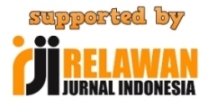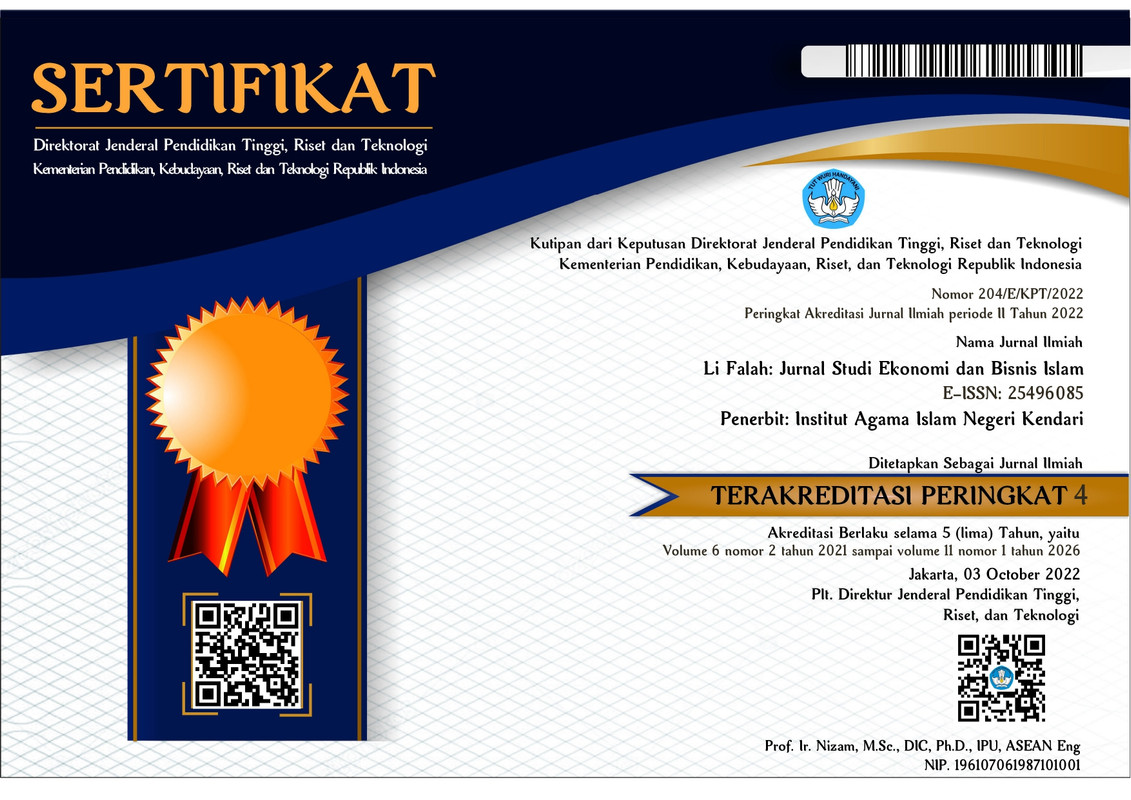Measurement of the Zakat Village Index in Curug Depok
Abstract
Keywords
Full Text:
PDFReferences
Ahmed, H. (2004). Role of Zakah and Awqaf in Poverty Alleviation. In Islamic Research and Training Institute.
Ahmed, H. (2008). Zakah, Macroeconomic Policies, and Poverty Alleviation: Lessons from Simulations on Bangladesh. Thoughts on Economics, 18(3), 81–105.
Akbarizan, Marizal, M., Soleh, M., Hertina, A, M. A., Yendra, R., & Fudholi, A. (2016). Utilization of Holt ’ s Forecasting Model for Zakat Collection in Indonesia. American Journal of Applied Science, 13(12), 1342–1346. https://doi.org/10.3844/ajassp.2016.1342.1346
Bahri, E. S., Aslam, M. M. A., Hj Hasan, A. A., & Wibowo, H. (2019). Maqasid Al-Shariah in Micro-entrepreneurs Development: an Overview. International Conference of Zakat, 258–267. https://doi.org/10.37706/iconz.2019.182
Bahri, E. S., & Khumaini, S. (2020). Analisis Efektivitas Penyaluran Zakat pada Badan Amil Zakat Nasional. Al Maal: Journal of Islamic Economics and Banking, 1(2). https://doi.org/10.31000/almaal.v1i2.1878
Beik, I. S., & Sartono, B. (2019). Proposing a Zakat Empowerment Program Using IDZ: Case from Cemplang Village, Bogor, Indonesia. International Journal of Zakat Vol., 4(131), 45–54.
Daly, S., & Frikha, M. (2015). Islamic Finance in Favor to Development and Economic Growth: An Illustration of the Principle of “Zakat.” Arabian Journal of Business and Management Review, 5(5). https://doi.org/10.4172/2223-5833.1000145
Hakim, F. N., Mahri, A. J. W., & Nurasyiah, A. (2019). Implementation of Zakat Village Index (Survey in Binangun Village, Pataruman Sub District, Banjar City). KnE Social Sciences, 3(13), 809. https://doi.org/10.18502/kss.v3i13.4249
Jamil, A. (2018). Implementasi Indeks Desa Zakat pada Desa Sungai Dua Kecamatan Rambutan (untuk Desa yang Terukur dan Berkelanjutan). KHOZANA: Jurnal Ekonomi Dan Perbankan Islam, 1(2), 245–257.
Jamilah, S. (2017). c. Ikhraith-Humaniora, 1(2), 45–52.
Kasri, R. A. (2016). Maqasid al-Shariah and Performance of Zakah Institutions. Kyoto Bulletin of Islamic Area Studies, 9(March), 19–41.
Ladiku, H. (2020). Analisis Epistimologi Zakat dalam Perspektif Fiqih. Jurnal Ilmiah AL-Jauhari: Jurnal Studi Islam Dan Interdisipliner, 5(1), 1–22.
Lailatussufiani, S., Burhan, M. U., & Multifiah. (2016). The Utilization of Zakat , Infaq and Shadaqah for Community Empowerment ( Case Study of BAZNAS West Nusa Tenggara Province ). International Journal of Business and Management Invention, 5(10), 152–160.
Lenap, I. P., Sasanti, E. E., Karim, N. K., & Sari, N. K. (2020). Zakat Disbursement Efficiency Based on Zakat Core Principles in Managing Zakat Funds in Baznas of West Nusa Tenggara Province. Jurnal Akuntansi Dan Bisnis, 20(1), 103. https://doi.org/10.20961/jab.v20i1.500
Maulida, S., & Rahmatullah, A. (2018). The Implementation of Indeks Desa Zakat ( IDZ ) for Priority Areas of the Zakat Community Development ( ZCD ) Program for the Empowerment of Productive Mustahiq in South Kalimantan. 3(3), 83–99.
Novianti, T., & Ali, K. M. (2018). Implementation of the Zakat Village Index to Support a Zakat Community Development Program in Bedono Village, Demak District. 3(3), 25–38.
Nurzaman, M. S., & Annisa, N. (2017). Implementasi Indeks Desa Zakat dalam Program ZCD Baznas. Iqtishodia.
Oktaviani, R., & Bahri, E. S. (2018). Zakat Produktif Sebagai Modal Kerja Usaha Mikro. 2(October), 101–120. https://doi.org/10.21070/perisai.v2i2.1686
Puskas. (2017a). Dampak Pendayagunaan Zakat Baznas Terhadap Kesejahteraan Mustahik di Indonesia. In Puskas (Vol. 57).
Puskas. (2017b). Indeks Desa Zakat. In Puskas.
Rais, I. (2009). Muzakki dan Kriterianya Dalam Tinjauan Fikih Zakat. Al-Iqtishad: Jurnal Ilmu Ekonomi Syariah, 1(1). https://doi.org/10.15408/aiq.v1i1.2456
S, A. B. (2016). Zakat sebagai Instrumen Pembangunan Ekonomi dan Kesejahteraan Ummat. Li Falah: Jurnal Studi Ekonomi Dan Bisnis Islam, I(2), 74–89. https://doi.org/10.31332/lifalah.v1i2.484
Sarif, S., & Kamri, N. ’Azzah. (2009). A Theoretical Discussion of Zakat for Income Generation and Its Fiqh Issues. Shariah Journal, 17(3), 457–500.
Satori Ismail, A., Farid Mas’udi, M., Bahri, E. S., Halim, I., Tajang, M. N., Qasim, F., Hambali, A., & Erianton, P. (2018). Fikih Zakat Kontekstual Indonsia. BAZNAS.
Triyani, N., Beik, I. S., & Baga, L. M. (2018). Manajemen Risiko pada Badan Amil Zakat Nasional (BAZNAS). Al-Muzara’ah, 5(2), 107–124. https://doi.org/10.29244/jam.5.2.107-124
Widiastuti, T., & Rosyidi, S. (2015). Model Pendayagunaan Zakat Produktif oleh Lembaga Zakat dalam Meningkatkan Pendapatan Mustahiq. Jurnal Ekonomi Dan Bisnis Islam, 1(1), 89–102.
Zalikha, S. (2016). Pendistribusian Zakat Produktif Dalam Perspektif Islam. Jurnal Ilmiah Islam Futura, 15(2), 304. https://doi.org/10.22373/jiif.v15i2.547
DOI: http://dx.doi.org/10.31332/lifalah.v6i2.2700
Copyright (c) 2022 Efri Syamsul Bahri, Widya Putri, Prayogo P. Harto

This work is licensed under a Creative Commons Attribution-ShareAlike 4.0 International License.
Li Falah : Jurnal Studi Ekonomi dan Bisnis Islam, Indexed In
Accredited By
View My Stats
Organized by : Fakultas Ekonomi dan Bisnis Islam
Published by : Institut Agama Islam Negeri Kendari
Jl. Sultan Qaimuddin No. 17 Baruga Kota Kendari Provinsi Sulawesi Tenggara
phone. +62401-3193710
Fax. +62401-3193710
Email: [email protected]



















